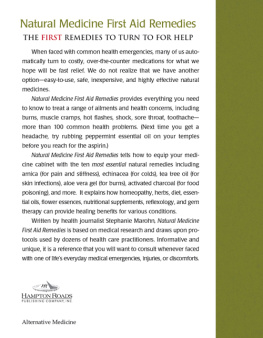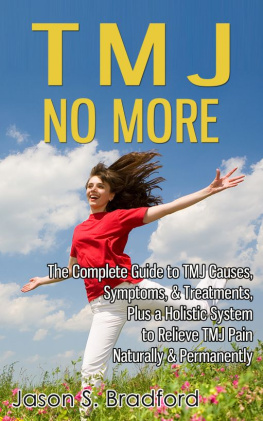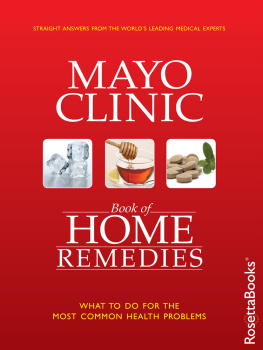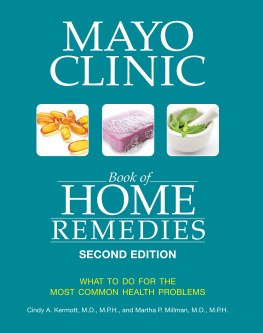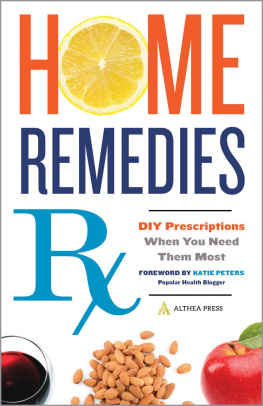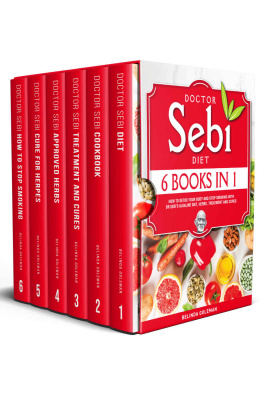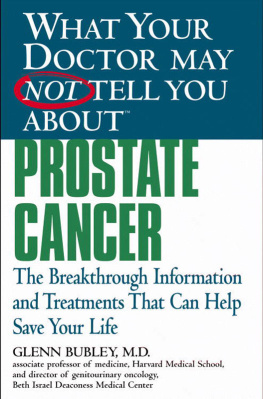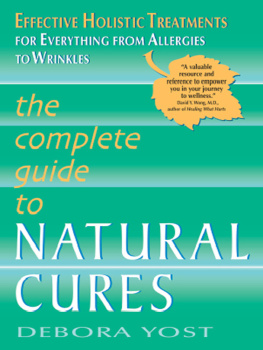Copyright 2004, 2014 by The Readers Digest Association, Inc.
All rights reserved. Unauthorized reproduction, in any manner, is prohibited.
Readers Digest is a registered trademark of The Readers Digest Association, Inc.
ISBN 978-1-62145-214-0
The Library of Congress has catalogued the original edition of this book as follows:
1,801 home remedies: trustworthy treatments for everyday health
problems / Readers Digest.-- 1st ed.
p. cm.
ISBN 0-7621-0488-0 (hardcover)
ISBN 978-0-7621-0602-8 (paperback)
ISBN 978-1-6214-5219-5 (eBook)
1.Therapeutics--Popular works. 2. Self-care, Health. I. Title: One
thousand eight hundred and one home remedies. II. Readers Digest
Association.
RM122.5.A15 2003
616.024--dc22
2003020949
Address any comments about 1,801 Home Remedies to:
The Readers Digest Association, Inc.
Adult Trade Publishing
44 South Broadway
White Plains, NY 10601
Visit our website at rd.com
Note to Readers
The information in this book should not be substituted for, or used to alter, any medical treatment or therapy without your doctors advice.
Contributors
Bookside Press
Editors Edward B. Claflin, E. A. Tremblay
Writers Matthew Hoffman, Eric Metcalf
Researchers Janel Bogert, Elizabeth Shimer
Project Editor Marianne Wait
Copy Editor Jeanette Gingold
Indexer Ellen Brennan
Illustrators Harry Bates, Inkgraved Illustration; Cindy Jeftovic
Designer Richard Kershner
Medical Advisors
Carolyn Dean, M.D., N.D. Consultant, Integrative Medicine, City Island, New York
Mitchell A. Fleisher, M.D. Clinical Instructor, University of Virginia Health Sciences Center and the Medical College of Virginia; Family Physician, Private Practice, Nellysford, Virginia
Larrian Gillespie, M.D. Retired Assistant Clinical Professor of Urology and Urogynecology, Beverly Hills, California
Chris Kammer, D.D.S. Center for Cosmetic Dentistry, Madison, Wisconsin
Chris Meletis, N.D. Chief Medical Officer and Director of Education Affairs, Pearl Clinic Professor of Natural Pharmacology, National College of Naturopathic Medicine, Portland, Oregon
Lylas G. Mogk, M.D. Henry Ford Visual Rehabilitation & Research Center, Grosse Pointe and Livonia, Michigan
Zorba Paster, M.D. Professor of Family Medicine, Dean Medical Center, University of Wisconsin-Madison
Ricki Pollycove, M.D., M.H.S. Clinical Faculty, University of California School of Medicine; Private Practice of Gynecology, San Francisco, California
David B. Posner, M.D. Chief of Gastroenterology,
Mercy Medical Center, Baltimore, Maryland; Assistant Professor of Medicine, University of Maryland School of Medicine
Adrienne Rencic, M.D., Ph.D. Attending Dermatologist, Mercy Medical Center, Baltimore, Maryland; Clinical Instructor, University of Maryland Medical System
Kevin R. Stone, M.D. Orthopedic Surgeon and Founder and Chairman of The Stone Foundation for Sports Medicine and Arthritis Research and the Stone Clinic, San Francisco, California
Cathryn Tobin, M.D. Pediatrician, Private Practice, Markham, Ontario
Table of Contents
Foreword
B Y C AROLYN D EAN , M.D., N.D.
W hen I was a young girl growing up in Dartmouth, Nova Scotia, my mother was known locally as the Queen of Common Sense. A trained nurse, she was renowned throughout the neighborhood for her compassion and down-to-earth advice. And she was much called upon. There were no doctors around, and people tended to fend for themselves. Everybody knew they could come to my mother with their ills. Whenever anyone with a cut or wound would come in, my mum would patch him up. She always knew what to do.
I have my mothers medical genes and also some from my fathers mother, who had a nurses training and was, in addition, a homeopath and an herbalist. When my grandfather moved his family from Boston to the northern part of Newfoundland, Nanna immediately started an herb garden. And she kept vials of homeopathic preparationswhich can be stored for decadessafely tucked away in her medicine cabinet. I grew up hearing incredible stories of her curing the most frightening conditions. Poultices were her particular favorites. She used them to remedy just about anything, from tonsillitis to badly infected wounds.
But if I came by my absolute love of home remedies through my family, that passion grew even stronger when I pursued medical training. An important part of medicine, I believe, is helping people take care of themselves. That has become even more evident in recent years. As medical doctors become busier, with many more patients and less time to spend with each one, the responsibility for taking care of our own small health problems falls increasingly on each one of us.
Theres a great deal that we can do, as youll quickly discover as you turn the pages of 1,801 Home Remedies . This is the kind of practical knowledge that comes in handy all the time. Years ago my nephew Erik was rough-housing, and sure enough, he ended up with a black eye. With some ice and application of homeopathic arnica (for pain, swelling, and bruising), his mother was amazed that the black-and-blue was completely gone by the next morning. Being a kid of ten, Erik was actually annoyed because he wanted to show off his black eye at school. Or take another recent incident, when one of my family members got a 21/4-inch splinter in his back. It took a whole week of repeated poultice applications before the splinter came out, but with patience, it finally emerged nicely, without surgical probing and with no sign of infection.
I love the big benefits of using little home remedies. Not only do they work, they allow you to take control of your health. They save you money, if you can come up with the simplest, commonsense solution (like ice and arnica for a black eye). And even more important, they can often nip illness in the bud and sometimes prevent the grave consequences of dealing with a health condition thats allowed to get worse.
I am occasionally asked whether home remedies are really a collection of old wives tales. Well, some of them are. But, remember, some of those old wives were the healers and midwives of the past who held considerable clout in the community and were consulted by everyone. My own mother and grandmother were shining examples for me. It was their training in commonsense healing that inspired me and motivated me to get my degree as a medical doctor and my advanced training in naturopathic medicine.
Today I even tell people that it is their patriotic duty to learn about home remedies. If there is a time when we have to deal with an epidemic or other medical emergency in our community, those who study 1,801 Home Remedies will be the ones who are able to deal with minor ailments at home and not overburden the health care system. It is up to us to learn these cures because doctors today are even less available and busier than ever.
Were at a turning point in medicine. At the same time that doctors are demanding scientific medicine, many are relying on research where only one drug is studied at a time, usually on a group of otherwise-healthy individuals. But there are no studies in which people take a handful of prescription medications together, which is unfortunately a much more common scenario for many people. Thats just one of the reasons why so many people are looking for simpler alternatives, and why those alternatives are ever more readily available.
I hope that by using 1,801 Home Remedies you may awaken your inner healer as you take charge of your own health and that of your family. The 100-plus health conditions that were selected for this book are absolutely appropriate for you and your family members to treat with home remedies, either by themselves or alongside conventional medical treatment. Much like my own practice, 1,801 Home Remedies is not just about herbs or supplementsnot just homeopathy, nutrition, or over-the-counter productsbut a selection from all that we know about healing approaches from many different traditions. And all the tips have you, the reader, in mind. They focus, therefore, on things that are practical, convenient, and ultimately doable.
Next page

